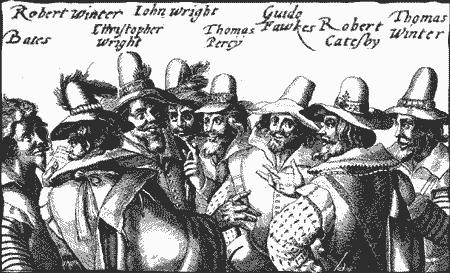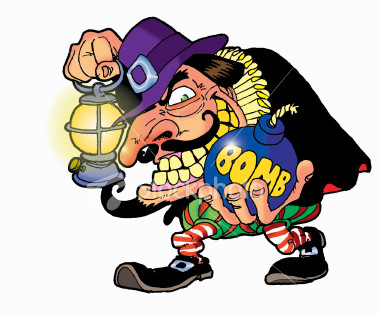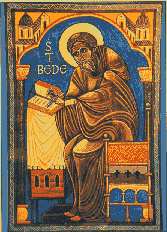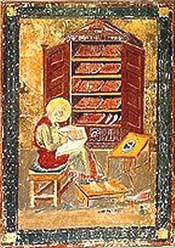 |
| The Rev'd Dr. Percy Dearmer |
2017-02-23
Historical and True Anglicanism
2011-11-05
Happy Bonfire Day 2011

Happy Guy Fawkes Day, everybody!
-
- Remember, remember the Fifth of November,
- The Gunpowder Treason and Plot,
- I know of no reason
- Why the Gunpowder Treason
- Should ever be forgot.
- Guy Fawkes, Guy Fawkes, t'was his intent
- To blow up the King and Parli'ment.
- Three-score barrels of powder below
- To prove old England's overthrow;
- By God's providence he was catch'd
- With a dark lantern and burning match.
- Holla boys, Holla boys, let the bells ring.
- Holla boys, Holla boys, God save the King! (Queen)

Here's to 494 years of the Gospel recovered, and 406 years of the Gospel in England providentially defended!
2010-11-05
Happy Bonfire Day!

Happy Guy Fawkes Day, everybody!
-
- Remember, remember the Fifth of November,
- The Gunpowder Treason and Plot,
- I know of no reason
- Why the Gunpowder Treason
- Should ever be forgot.
- Guy Fawkes, Guy Fawkes, t'was his intent
- To blow up the King and Parli'ment.
- Three-score barrels of powder below
- To prove old England's overthrow;
- By God's providence he was catch'd
- With a dark lantern and burning match.
- Holla boys, Holla boys, let the bells ring.
- Holla boys, Holla boys, God save the King! (Queen)

Here's to 492 years of the Gospel recovered, and 404 years of the Gospel in England providentially defended!
2010-05-27
Anglican Adiaphora
And also internationally. We have for years in the Anglican Communion operated a tacit rule of agreeing to differ about many things but trying not to do or say things which will cause other Anglicans to stumble. The Lambeth Conference has been the main instrument of this process: broad agreement can be reached on major issues while the provinces retain autonomy in their own lives. Thus, for instance, the Lambeth Conference agreed that it was all right to admit children to Communion prior to Confirmation, which then opened up the question for any individual Province to discuss, as most now have. Our own General Synod repeated Lambeth’s point, so the issue was then passed down to dioceses. Our own Diocese in turn agreed, so the issue has now become a matter for individual parishes. That is a model of how you discern that something is adiaphora, and how you deal with the issue once that has been decided, respecting consciences all the way through. It highlights again this key point: the question of whether a particular issue is adiaphora or not cannot itself be adiaphora. It wouldn’t have done for the Parish of St-Muddy-by-the-Sea to decide independently that the question of unconfirmed children receiving Communion was adiaphora and then proceeding to take its own decision without reference to its diocese, its province, or the whole Communion.
The principle of adiaphora was itself, in fact, a matter of life and death. The doctrine that some things are adipahora, and some aren’t, is not itself adiaphora. The decision as to which things make a difference and which do not is itself a decision which makes a huge difference. Some of the early English Reformers claimed explicitly that they were dying precisely for the principle of adiaphora itself, for the right to disagree on certain points (not on everything). That for which you will give your life is hardly something which doesn’t make a difference.
Read the whole thing here.
2010-05-25
The Venerable Bede
 Bede was a monk at the English monastery of Wearmouth and Jarrow, in Northumbria. From the age of seven, he spent all his life at that monastery except for a few brief visits to nearby sites. He says of himself: "I have devoted my energies to a study of the Scriptures, observing monastic discipline, and singing the daily services in church; study, teaching, and writing have always been my delight."
Bede was a monk at the English monastery of Wearmouth and Jarrow, in Northumbria. From the age of seven, he spent all his life at that monastery except for a few brief visits to nearby sites. He says of himself: "I have devoted my energies to a study of the Scriptures, observing monastic discipline, and singing the daily services in church; study, teaching, and writing have always been my delight." He was the first person to write scholarly works in the English language, although unfortunately only fragments of his English writings have survived. He translated the Gospel of John into Old English, completing the work on the very day of his death. He also wrote extensively in Latin. He wrote commentaries on the Pentateuch and other portions of Holy Scripture. His best-known work is his History of the English Church and People, a classic which has frequently been translated and is available in Penguin Paperbacks. It gives a history of Britain up to 729, speaking of the Celtic peoples who were converted to Christianity during the first three centuries of the Christian era, and the invasion of the Anglo-Saxon pagans in the fifth and sixth centuries, and their subsequent conversion by Celtic missionaries from the north and west, and Roman missionaries from the south and east. His work is our chief source for the history of the British Isles during this period. Fortunately, Bede was careful to sort fact from hearsay, and to tell us the sources of his information.
 He also wrote hymns and other verse, the first martyrology with historical notes, letters and homilies, works on grammar, on chronology and astronomy -- he was aware that the earth is a sphere, and he is the first historian to date events ANNO DOMINI, and the earliest known writer to state that the solar year is not exactly 365 and a quarter days long, so that the Julian calendar (one leap year every four years) requires some adjusting if the months are not to get out of step with the seasons.
He also wrote hymns and other verse, the first martyrology with historical notes, letters and homilies, works on grammar, on chronology and astronomy -- he was aware that the earth is a sphere, and he is the first historian to date events ANNO DOMINI, and the earliest known writer to state that the solar year is not exactly 365 and a quarter days long, so that the Julian calendar (one leap year every four years) requires some adjusting if the months are not to get out of step with the seasons.
His hymns include one for the Ascension. Suggested tune is Agincourt, also called Deo Gratias (or Gracias), which follows:
| Clyde McLennan - Creator of the earth and skies .mp3 | ||
 | ||
 | Found at bee mp3 search engine |  |
A hymn of glory let us sing;
New songs throughout the world shall ring:
Christ, by a road before untrod,
Now rises to the throne of God.
The holy apostolic band
Upon the Mount of Olives stand;
And with his followers they see
Their Lord's ascending majesty.
To them the angels drawing nigh,
"Why stand and gaze upon the sky?
This is the Savior," thus they say;
"This is his glorious triumph day.
"Again shall ye behold him so
As ye today have seen him go,
In glorious pomp ascending high,
Up to the portals of the sky."
O risen Christ, ascended Lord,
All praise to thee let earth accord,
Who art, while endless ages run,
With Father and with Spirit one.
Readings:
- Psalm 78:1-4
Wisdom 7:15-22
1 Corinthians 15:1-8
Matthew 13:47-52
Preface of a Saint (1)
PRAYER (contemporary wording)
h/t Satucket
2010-02-10
CofE General Synod Affirms ACNA

from ACNA:
Today, the General Synod, the national assembly of the Church of England, meeting in London February 8-12, affirmed the Anglican Church in North America’s desire “to remain within the Anglican family.”
The Most Rev. Robert Duncan, archbishop of the Anglican Church in North America, thanked Mrs. Lorna Ashworth of Chichester for bringing the church to the attention of the General Synod. “We are very grateful to Mrs. Ashworth and the scores of other friends in the Synod of the Church of England for all they did to give us this opportunity to tell our story to the mother church of the Anglican Communion. It is very encouraging that the synod recognizes and affirms our desire to remain within the Anglican family.” said Archbishop Duncan.
A private member’s motion, put forward by Mrs. Ashworth, and subsequently amended by the Synod, states that “this synod…recognize and affirm the desire of those who have formed the Anglican Church in North America to remain within the Anglican family.” The motion passed by a resounding 309 – 69 margin (with seven abstentions).
The motion was amended by the Right Reverend Michael Hill, the Bishop of Bristol. His purpose, in his own words, was “(1) to encourage those who are part of the Anglican Church in North America; (2) to commend the process of recognition afforded by the Instruments of the Anglican Communion; and (3) to ask the Archbishop of Canterbury to report progress back to Synod in a year’s time.”
The discussion at Synod presented an important opportunity for members of the Anglican Church in North America, joined by many friends in the United Kingdom, to share the vision and mission of the church with fellow Anglicans. “We are deeply thankful that we were given the opportunity to tell the Synod about our church, and our vision for reaching North America with the transforming love of Jesus Christ. This chance to speak directly to our Anglican family was very rewarding. We look forward to working with the friends we made and reaching out to others in the years ahead,” said Bishop Donald Harvey, who, with Mrs. Cynthia Brust, Dr. Michael Howell, and the Rev. Dr. Tory Baucum, represented the Anglican Church in North America in preparation for the Synod vote.





